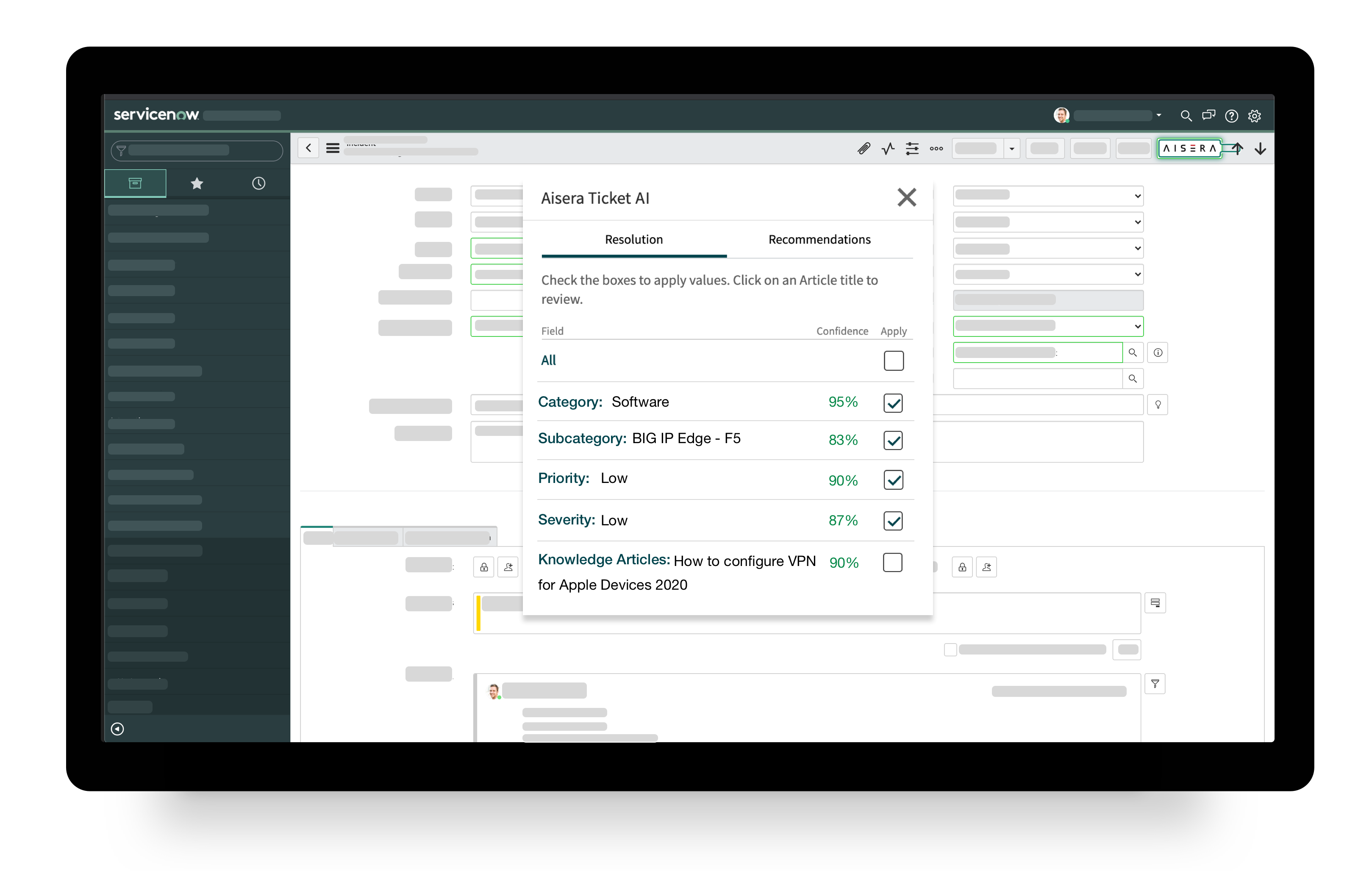Aisera, a startup developing what it calls an “AI-powered” support ticketing system, today announced it has raised $90 million in Series D funding led by Goldman Sachs with participation from Zoom, True Ventures, Menlo Ventures, Norwest Venture Partners, Icon Ventures, Khosla Ventures, First Round Capital and others. CEO Muddu Sudhakar said the modern funds will be used for market expansion and support of Aisera’s go-to-market strategy, as well as investments in the company’s product development, research and development, sales and marketing initiatives.
Sudhakar says he built Aisera after seeing a need for “predictive AI” solutions that could automatically solve customer service, IT, sales and operations problems. Using artificial intelligence, the platform connects to existing registration systems, including support portals, to respond to incoming queries and requests.
Sudhakar founded Aisera in 2017 with long-time collaborator Christos Tryfonas. Sudhakar most recently led teams at ServiceNow and EMC, and previously founded startups (Caspida, Cetas, Kazeon, and Sanera Systems) that were acquired by VMware and Splunk. Tryfonas, a former AT&T Bell Labs researcher, worked with Sudhakar on several of his ventures before joining Aisera.
“We thought [the pandemic] would be a problem, but Aisera’s technology performs very well in remote environments. “Customers wanted AI and automation to drive user engagement and solution adoption,” Sudhakar told TechCrunch in an email interview. “Now, in the face of the current market downturn, we see the need to reduce licensing and people costs. This is driving demand for Aisera because we can help organizations reduce the cost of IT and business services.”
As Sudhakar explains, the Aisera platform learns to solve problems by combining language analysis artificial intelligence and robotic process automation, or RPA. RPA technology attempts to mimic the way humans interact with software to perform basic, repetitive tasks at scale. This isn’t a particularly novel idea – RPA vendors including Automation Anywhere and UiPath claim they can do it to some extent. Sudhakar, however, says Aisera’s RPA brand is custom-built with customer/employee service utilize cases in mind.
“In some ways, Aisera competes with ServiceNow and Zendesk, but it also complements those solutions because we work with them as well as Amazon Web Services, Microsoft, Salesforce, Atlassian and Cisco,” Sudhakar said. “Aisera is unique and diverse in its ontology and taxonomy for each domain and vertical… [We also do] Learning and training AI on customer data sets to capture specific intents, expressions and utterances required for natural language processing and natural language understanding“
When a request comes in via email, voice, ticket or chat room, Aisera tries to understand it by analyzing it using an algorithm trained to understand the language. The platform then connects sources such as ServiceNow, Salesforce, Oracle, Confluence and SharePoint to obtain customer data to personalize response to the request. After this step, Aisera creates a list of actions that need to be taken to fulfill the request and passes it to the “workflow management” engine.
Aisera may return articles or snippets of articles from the company’s knowledge base that most likely answer the customer’s question. What’s more, it can automatically take certain actions, such as resetting a user’s password – this is where RPA comes in handy – or direct requests to the appropriate team. For more complex problems, Aisera can also provide teams with “next best action” recommendations, improving with each additional data point.
“Our technology helps companies improve operational performance while enabling them to reduce costs associated with technical assistance and support, customer service and support, and [more]– added Sudhakar. “Aisera provides solutions for both large and small organizations that can be used in business-to-business and business-to-consumer markets across IT, HR, cybersecurity, customer service, sales, marketing, legal and finance departments.”
Aisera says she does a lot. Unfortunately, without access to internal data, it is complex to determine how well the product works in practice. The platform claims to recognize over 70 languages, but does it understand them all equally well? What happens if Aisera makes a mistake (e.g. downloading the wrong support article) while processing requests?
In response to questions from TechCrunch, Sudhakar said: “When the conversational AI (solution) is incorrectly understood and implemented, Aisera [can codify] error and warning scenarios [or allow customers to] talk to a live agent or create a case or I will call you back. Aisera also has an alert and notification studio that can trigger workflows to notify users and administrators in the event of a workflow failure.”
However, taking a step back and looking at the broader industry, it becomes clear that there is a lot of interest in AI technologies in customer service. 2021 questionnaire from ManageEngine (Zoho’s IT division) found that 59% of U.S. executives are using artificial intelligence – such as in chatbots – to improve customer service in some way. Whether realistic or not, AI is seen by many as a path to higher efficiency (i.e. handling more customer inquiries with fewer resources) and greater personalization (i.e. upselling).

Competition aside, Sudhakar believes Aisera is well-positioned for growth, with over 100 customers and close to 80 million users. Current subscribers include brands such as Zoom, Chegg, McAfee and Autodesk, as well as federal, state, military and defense agencies.
“We operate in a somewhat recession-proof industry where our cloud- and AI-based technology can better accommodate budgets compared to others. Artificial intelligence and automation are key pillars to beat inflation,” Sudhakar said. “Aisera is experiencing tremendous growth – 300% year-on-year – with gross margins of 80% to 90%. . . . While the tech industry faces uncertainty and some economic headwinds, Aisera’s business is thriving.”
To date, Aisera, which employs approximately 250 people, has raised $180 million in capital.

